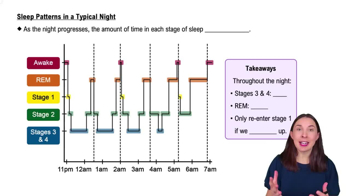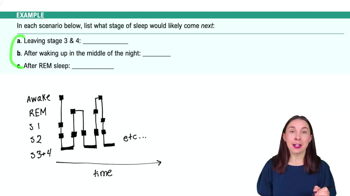Table of contents
- 1. Introduction to Psychology1h 43m
- 2. Psychology Research2h 20m
- 3. Biological Psychology2h 41m
- 4. Sensation and Perception28m
- 5. Consciousness and Sleep32m
- 6. Learning41m
- 7. Memory34m
- 8. Cognition37m
- 9. Emotion and Motivation35m
- 10. Developmental Psychology33m
- 11. Personality48m
- 12. Social Psychology41m
- 13. Stress and Health41m
- 14. Psychological Disorders44m
- 15. Treatment47m
5. Consciousness and Sleep
Sleep
Struggling with Psychology?
Join thousands of students who trust us to help them ace their exams!Watch the first videoMultiple Choice
A person who is full but still takes another helping of food at dinner because it tastes so good is eating because
A
eating is a physiological need.
B
eating is a form of stimulus motivation.
C
the taste of the food is the incentive for eating.
D
sensation seekers tend to eat when they are not hungry.
 Verified step by step guidance
Verified step by step guidance1
Identify the key components of the problem: the person is full, the food tastes good, and the person continues to eat.
Understand the concept of physiological needs: these are basic requirements for human survival, such as hunger, which is not the primary reason in this scenario since the person is already full.
Explore the concept of stimulus motivation: this refers to the drive to experience new and varied stimuli, which might not directly apply to the act of eating in this context.
Consider the role of incentives: an incentive is an external factor that motivates behavior. In this case, the taste of the food acts as an incentive, encouraging the person to eat despite being full.
Reflect on the behavior of sensation seekers: these individuals seek novel and intense experiences, which might include eating for pleasure rather than hunger, but the primary focus here is on the incentive of taste.

 3:25m
3:25mWatch next
Master Circadian Rhythms with a bite sized video explanation from Hannah Gordils
Start learningRelated Videos
Related Practice


































































































![Race, Genes and IQ Differences | Bret Weinstein [Mini Clip]](https://img.youtube.com/vi/IztL_m3pd70/mqdefault.jpg)



































































































